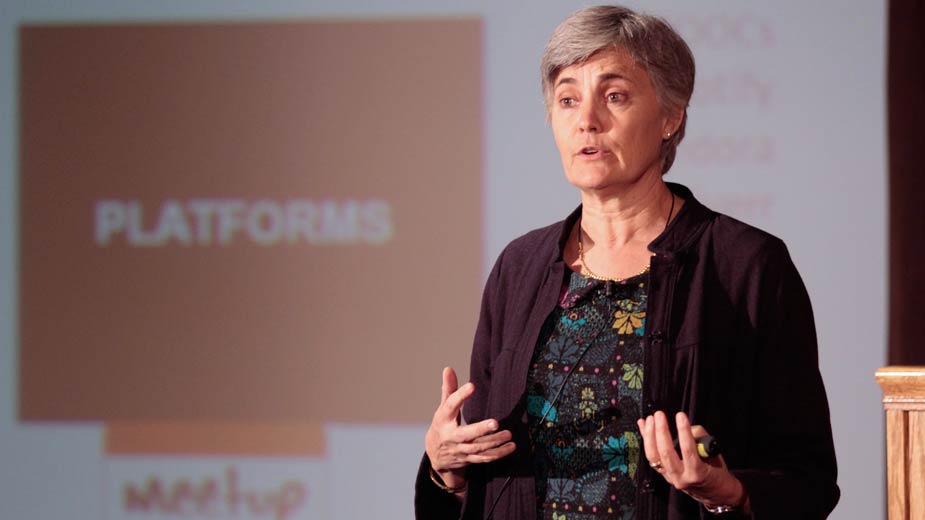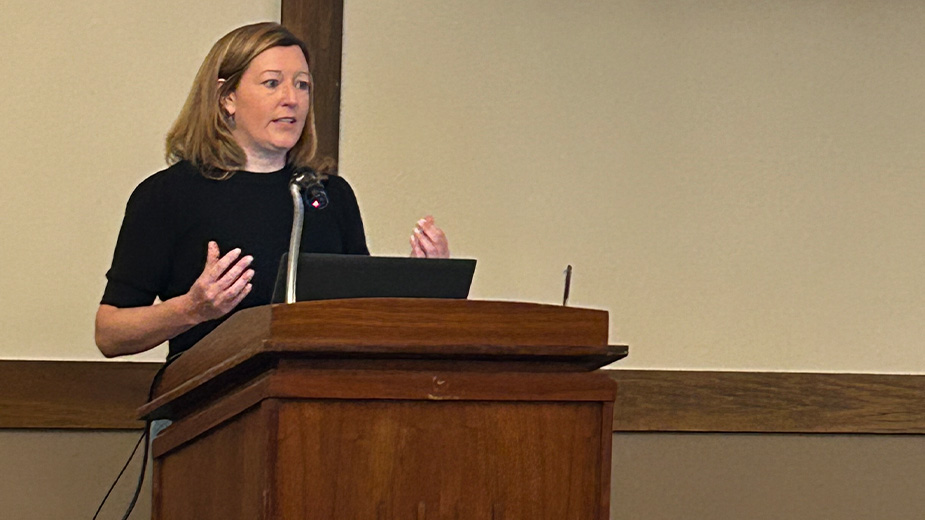Author Hails Arrival of ‘Peers Inc.’ New Economy
YOUNGSTOWN, Ohio – A new collaborative economy is replacing the old model of industrial capitalism, says Robin Chase, transportation entrepreneur and author of the new book Peers Inc.
Chase, who co-founded the car-sharing company Zipcar in 2000, outlined the key components of “this new business structure that is taking over the world” during her talk as part of Youngstown State University’s Thomas Colloquium Monday night at Stambaugh Auditorium.
Amazon, Zipcar, Uber and Airbnb are all examples of extraordinarily dynamic companies that are part of something Chase calls “Peers Inc.”
“Unlike any other time in the history of humans, we are able to have the power of industrialization as well as the power of the unique, customized and specialized in the same organization,” she said.
Chase calls this “Peers Inc.” – combining excess capacity, a platform for participation and a diverse group of peers to reshape the economy the very model of how companies do business.
These new companies tap into people, whom Chase calls “peers,” by providing platforms that are easy and affordable to use.
It “combines the best of people power with the best of corporate power,” as Chase writes in her book.
Zipcar and Airbnb are two examples Chase used to illustrate this new model.
Zipcar allows its customers to reserve a car to rent by the half hour, hour or day, in metropolitan areas. They are sent an access card and locate the car and unlock it on their own. They later return it to the same space.
Airbnb is an online marketplace that enables individuals to rent their own rooms, houses, or apartments to others as short-term lodging. The company itself owns no lodgings. It provides the online marketplace and makes it easily accessible.
Both companies provide platforms that allow easy participation and for both sellers and buyers to rapidly take advantage.
They also deal with a problem of excess capacity, something Chase emphasized repeatedly in her talk.
Excess capacity “already exists, already is paid for, but there’s more value there,” Chase said.
In the case of Zipcar, the service allows individuals the ready use of an automobile at a multitude of convenient times and locations without the need to own and maintain an automobile.
Airbnb allows owners to readily rent their excess lodging to users who can quickly access it through a standardized online marketplace.
“They built a platform for participation that harnessed existing capacity and brought in this collaboration of others,” Chase said.
Not only are these collaborative businesses convenient, they grow incredibly fast, she said.
Airbnb, for example, has a market value of $31 billion after only nine years in business, Chase said, while InterContinental Hotels Group PLC and Hilton Hotels & Resorts – traditional hospitality companies –have a value of $9 billion and $18 billion, respectively.
“This new business model produces companies that are the most valued,” Chase said.
Alibaba Group is another Peer Inc. company, Chase said. The Chinese e-commerce company broke records with a $22 billion initial public offering in 2014.
Chase also posited that the Peers Inc. model could be a powerful tool to fight the “existential crisis of climate change.”
Traditional approaches to problems climate change poses won’t work, she said.
“When I think about solutions to climate change – and I’m in the transportation sector – building high-speed rail up and down California, that’s going to take 20 years before we’re going to see any environmental benefit from that. It’s too late.”
“We have to do stuff with the assets we have here now, with the people we have here now and we have to do it with a much different approach.”
Copyright 2024 The Business Journal, Youngstown, Ohio.



